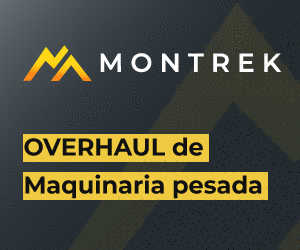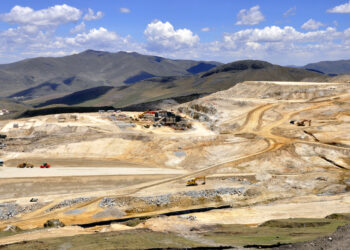MINE is back for another issue packed with industry news and analysis. In this issue, we look at how mining lobbies are adapting for the modern world, Airobotics drones, a look at the best electric mining vehicles, and more.
Whether you are on a desktop, tablet or smartphone, you can read the magazine for free online.
As the demand for rare earth metals continues to grow, and supplies are threatened by international tensions, the US is turning to Africa to develop mining projects.
Artisanal mining often receives a lot of criticism, but the industry is also vital to the 40 million miners around the world who work in it. We spoke to PACT, a charity that is looking to emphasis the vital role the industry plays and improve it for artisanal miners. In the Philippines, efforts to improve the industry are already underway, as demonstrated by a new law exempting registered small-scale miners from excise and income taxes when selling their gold to the country’s central bank.
From the DRC to Peru, mines often turn to the military for protection, but how effective such actions are highly debated. We take a look at the balance of benefits and risks when the military gets involved in mining.
Finally, we ask whether silver has lost its lustre, look at a project aiming to clean up water in Cornwall, and find out how you move a town to save a mine by looking at the Swedish town of Kiruna.
In this issue
Into Africa: the US’s drive for African rare earth minerals
Despite the US’s near-total reliance on China as a source of rare earth minerals, the two countries have escalated a trade war that could see the US deprived of some of the most valuable minerals in the technology sector. Africa has emerged as an alternative source of rare earth minerals, yet a lack of concrete agreements between the US and African producers has raised uncertainty over the future of rare earths in the US. JP Casey finds out more.
Moving a town to save a mine: the story of Kiruna
The Swedish town of Kiruna is sinking into the caverns excavated by more than half a century of iron ore mining in the region. In response, local officials and the state-owned miner responsible for the mining work are committing over a billion dollars to relocate much of the town 3km to the east, trying to transplant the spirit of Kiruna to a new, safer, location. JP Casey takes a look at how you can move a village, to save a mine.
The future of small-scale gold mining in the Philippines
Earlier this year the Philippine Government passed a new law exempting small-scale gold miners from excise and income taxes when selling to the country’s central bank – Bangko Sentral ng Pilipinas (BSP). Here, Scarlett Evans looks into the new law and its potential impact on both the Philippine economy and small-scale mining in the country.
Hands on the wheel: how the rapidly evolving auto industry is changing mining forever
While the auto industry has never stood still, the rise of electric vehicles and emergence of a new middle class in countries like India and China is changing the industry at a much faster pace than ever before, sending shockwaves through the mining world. Molly Lempriere and Jack Unwin take a close look at the modern relationship between the industries and ask, what does the future hold?
The complexities of military involvement in mining
In the Democratic Republic of Congo, the military has deployed hundreds of troops to protect a copper and cobalt mine from illegal mining, while in Peru the government is cracking down on unlicensed miners operating in the Amazon rainforest. Should the military get involved in mining? Patrick Kingsland finds out.
Artisanal mining: a dangerous trade or a misrepresented industry?
Artisanal mining is often painted as the dark side of mining, an industry riddled with smuggling, fraud and danger. Small-scale mining does however provide a livelihood for millions, a fact that non-profit Pact believe should act as a rocket for improvement, rather than demonisation. Scarlett Evans talks to Christina Villegas from the charity about the industry.
Heavy metal: the fight to cleanse Cornwall’s polluted rivers
Tin mining in Cornwall and West Devon has left a dual legacy. On the one hand its historic mining landscape was named a UNESCO World Heritage Site in 2006, but on the other there are toxic rivers due to poisonous metals from the mines infecting the main water streams. Jack Unwin examines the efforts by local and central government to cleanse the area.
Inefficient and uncertain: is silver losing its lustre?
Once considered a “safe haven asset”, silver has seen its performance blighted by inefficient production, international tensions and collapsing prices, casting doubts over the future of the commodity. While technological improvements and the growing demand for solar panels could inspire a recovery in silver, the future of the metal remains uncertain. JP Casey takes a look.
Next issue preview
Minerals are the second largest export in Rwanda, and the government is seeking to capitalise on its resources wealth by encouraging foreign investment. Will such moves leave behind the artisanal miners who currently make up the majority of the workforce?
In Peru, the contentious Tia Maria project continues to forge ahead, we take a look at the mega mine and the locals concerns. Elsewhere we see how political divisions can impact mining investments by talking to Casey Research. And two of our writers argue about the deepsea mining debate: is it a necessary industry for greening the world, or too risky to even be considered?
Gold is currently having its best run in years, going up 8% in June alone, we take a look at the factors behind this glittering run. Rare Earth Minerals are still in high demand thanks to their role in global electrification, we talk to the Rare Earth Industry Association about how the sector can create a sustainable future for the sector.
Finally, we take a look at using behavioural science to make mining safer, and the legacy of Chris Cline and the Foresight group in Illinois’s mining industry.














